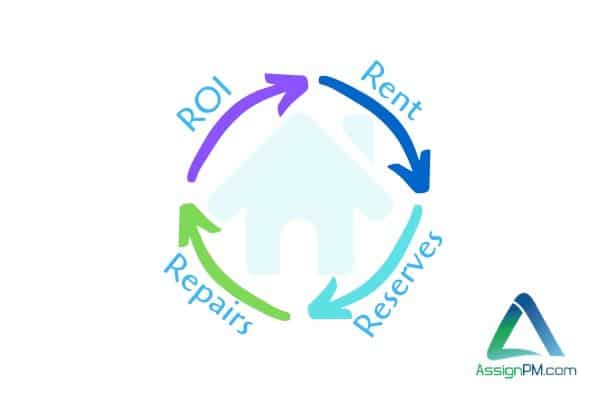Knowledge is power! And sharing that knowledge with real estate investors, and anyone thinking about investing in rental property is something we are passionate about. We especially enjoy sharing about what we call the (4) R’s of a Rental Property Investment as the blueprint for how the money flows for the investor in the rental property transaction and property management service.
The (4) R’s of a Rental Property Investment:
RENT: Rent is the gross income paid by the tenant before expenses. It’s important the property management company price a rental property so that 1.) it leases quickly to avoid vacancy and 2.) so it achieves the highest reasonable gross income from rent.
RESERVES: Reserves are funds held by the property management company so they can take care of repairs quickly and efficiently. Most common repairs are minor, and by having reserves available allows the issues to be handled quickly, which keeps a tenant feeling they matter. More often than not, reserves save clients time and money.
REPAIRS: Repairs management are a daily responsibility of a full-service property management company, which means receiving maintenance requests, turning them to work orders, notifying the owner and responding to tenants, assigning the work order to a vendor, overseeing the repair, updating the owner, receiving the invoice, and paying the vendor for good work completed. A great property management company has a trusting relationship with an investor-landlord who has given them leeway to make a judgment call that best serves the property. But that leeway usually operates within an “allowable” range of repairs up to $250, and anything over that will require owner-approval. This allows the property management company to take care of minor repairs and not interrupt the investor-landlord’s busy lives with the day-to-day maintenance of the home. In 2018, Assign Property Management’s average spent on home repairs was $1075.06, which isn’t a bad annual investment for maintaining a rental property.
ROI: Return-On-Investment…ultimately, everyone wants to know, “what’s the bottom-line?” Your ROI measures the gain or loss from your initial investment. As a general rule of thumb, a range of 5% to 12% is a good ROI. What varies in this result is the Location, Price and Condition of your property.
Closing Thoughts
It’s important for any property management company to treat your investment like its own. By focusing on the (4) R’s of a Rental Property Investment, you put yourself in a better position to building wealth creation through real estate. Contact Assign Property Management today to help you review how your current property portfolio can return a better ROI, or leverage their expertise to help you buy your next investment property.
Article written by Deanna Parnell and John Davis

